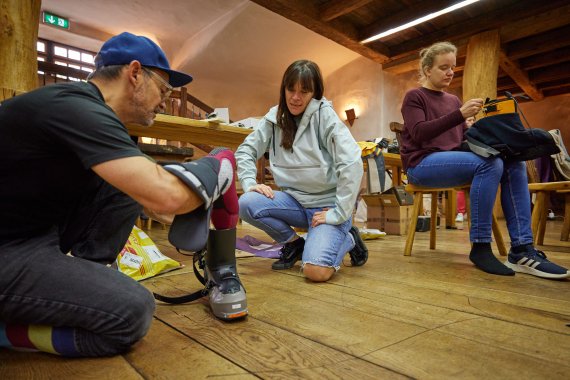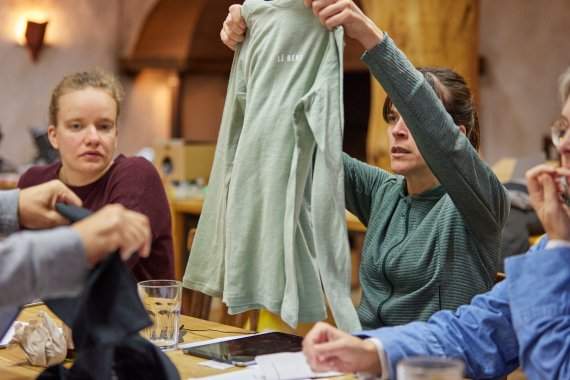A quiet farmstead near Bayrischzell. The surrounding mountain landscape delicately powdered with the first snow. Pure idyll. In one part of the building, the main house of the farm, hustle and bustle. The Hasenöhrl Hof, a cozy cooking and event location of the eponymous owner and chef Bärbl Hasenöhrl, provided part of the premises for the fourth jury meeting of the ISPO Award this year.

And space was needed. After the process and concept of the ISPO Award were adapted a year ago now, the industry has fully embraced the new direction. Since the award is now presented throughout the year (amongst other things via a review report on ISPO.com) and at the winners' preferred time, the jury now meets on a quarterly basis to be able to evaluate the submissions on a regular basis. All winning products and services can still be viewed at the two ISPO trade shows, OutDoor by ISPO and ISPO Munich, and the award winners can be celebrated at the ISPO Award Gathering. Before this year's ISPO Munich, which takes place for the first time in November, and the ISPO Award exhibition there, the jury had many new products to choose from. Well over 100 submissions had to be evaluated by the jury consisting of industry experts and the so-called Collaborators, consumers with an affinity for sports. The number of entries can clearly be considered a success.
Can the sheer mass of products also stand up to the high quality standards of the ISPO Award? This was exactly what the jury had to find out. Once again, ISPO.com Editor-at-Large Andi Spies, a passionate surfer and snowboarder as well as a broadly based product expert and gear nerd, was an integral part of the jury this quarter. The Munich native was again flanked by his two colleagues Dr. Regina Henkel, an expert in textiles and fibers, and Martina Wengenmeir, an avid ski tourer and professor of sports journalism and digitalization. The three earlier mentioned Collaborators of this jury meeting consisted of Franziska Höll, a laboratory engineer with special knowledge regarding lightweight metals such as carbon, running coach André Meyer and sports scientist & engineer Dominic Rasp. His speciality is biomechanics, with research focus on ACL injuries in ski jumping and running. It was now up to these six jurors to sort the numerous products and evaluate them according to various criteria.
An additional challenge – the time pressure. Because this round of judges also only had two days to evaluate the products. Tight timing and smoking heads were contrasted with culinary delicacies and one or two sporting activities to compensate. One activity should be briefly mentioned at this point: crossgolfing was on the agenda for the second day. As a prize and incentive, an AlpenPlus ski card was ready to be received by the winning team. And so, in the rain, between hole-in-one and shots far from the target holes, all golfing skills were thrown into the ring. The team Henkel/Rasp secured the victory.

In order to classify the products, point out certain details, and give an initial assessment, the panel of experts was moderated by the author of this article, a freelance sports journalist and experienced test editor for magazines such as skiMAGAZIN. In this way, the flood of information was supplemented by an additional neutral opinion and also the hint at one or the other special feature of a product.
And so, despite the tight schedule, there was testing, touching, discussing, sometimes wrestling over decisions and weighing up the pros and cons of a product. A process that was worthwhile. Because one thing can be said: The sheer number of truly exciting innovations, predominantly in the field of fiber technologies, was simply impressive. "It fits perfectly with the outdoor theme that manufacturers are placing greater emphasis on sustainability," says Dominic Rasp, describing his impressions of the products submitted. "I feel it is good when sustainable materials are the real innovation."

In addition to new fabrics and materials, the focus continues to be on products for easy entry. A changed sports world is also leaving its mark on manufacturing and product development.
Other trends that can be identified are a more consistent focus on more robust products designed for durability and the will to produce mono-materials for a functioning cycle. This has led to a new level of sustainability and forward-looking products. AI technologies and thoughtful connections of textiles with technical uses such as apps are also playing an ever-increasing role. It was also worth taking an extra look, because the novelties and innovations were not always obvious at first glance. And so, on many occasions, an ISPO Award candidate deserved a second look.
In the end, 58 products achieved the required score to be honored with the ISPO Award. To achieve this score, each product is evaluated according to strict criteria and a point system. This is done neutrally and independently. While there were only 16 products that received awards in the summer, there are now significantly more winners. "Despite the high number of winners in this jury meeting, the annual average number of ISPO Awards presented is on a par with previous years. In 2019, we had even more ISPO Award winners," explains Christina Rabl, Product Owner of the ISPO Award. "Quality stands above all else and decides whether a product wins an ISPO Award or not."
The fact that, despite the mass of entries, there was also a massive increase in the quality of the products submitted, shows that the industry is well on its way to realizing its full potential. The winners will be on display at the Future Lab at ISPO Munich 2022 from November 28 to 30.
- Awards
- Mountain sports
- Bike
- Fitness
- Health
- ISPO Munich
- Running
- Brands
- Sustainability
- Olympia
- OutDoor
- Promotion
- Sports Business
- Textrends
- Triathlon
- Water sports
- Winter sports
- eSports
- SportsTech
- OutDoor by ISPO
- Heroes
- Transformation
- Sport Fashion
- Urban Culture
- Challenges of a CEO
- Trade fairs
- Sports
- Find the Balance
- Product reviews
- Newsletter exclusive area
- Magazine




